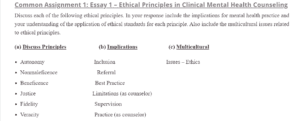Ethical Principles in Clinical Mental Health Counseling
Ethical Principles in Clinical Mental Health Counseling
Are you in need of a genuine copy of “Ethical Principles in Clinical Mental Health Counseling”? Contact us for support.
Ethical Principles
Autonomy: This fundamental ethical principle requires mental health professionals to make decisions about their health (Koocher & Keith-Spiegel, 2008). This principle is pegged on the right to self-governance for patients. In mental health care, professionals must ensure that all patients are offered the chance to make important decisions about their health.
Nonmaleficence: This principle requires that all health professionals act in ways that do not harm others. In particular, health professionals should work in ways that do not cause avoidable patient harm (Koocher & Keith-Spiegel, 2008). Counselors must make decisions in the client’s best interest in mental health care.
Beneficence: This principle promotes the idea that every action should aim to achieve good. In every action that a health professional takes, a good outcome should be expected (Koocher & Keith-Spiegel, 2008). In mental health, the actions taken by professionals should aim to improve the client’s mental health.
Justice: This is a broad principle of ethics that requires the application of fairness, equity, and equality in the implementation of health care services (Koocher & Keith-Spiegel, 2008). The concept of justice is essential in mental health care. Mental health services must be allocated to all people equitably and fairly.
Fidelity: This principle requires that mental health professionals remain loyal to the patient (Barker, 2011). Loyalty includes keeping promises, being trustworthy, and doing what is expected. Mental health professionals are expected to be loyal to the patients they serve. For instance, a patient requires that a professional keep their information confidential. Thus, the counselor must fulfill this expectation.
Veracity: This is the ability to maintain truthfulness at all times. Regardless of the situation, mental health professionals are expected to be truthful at all times regarding the mental health of their patients. Full disclosure of a patient’s information is essential, according to the principle of integrity.
Aspirational Ethics: This describes the desire for a person to perform their duties according to the best standards possible (Koocher & Keith-Spiegel, 2008). Mental health professionals are expected to have the aspiration to demonstrate the best possible performance. In this way, they can provide the best possible care at a given point.
Mandatory Ethics: These are compulsory laws that every professional must comply with. For instance, if a counselor has a conflict of interest with a patient, they are legally required to refer the patient to another counselor (Barker, 2011). This is a law that they have no choice but to obey.
Implications for Mental Health Practice Under Ethical Principles in Clinical Mental Health Counseling
A combination of ethical principles helps to promote inclusion. Health professionals can create an inclusive environment for all people when guided by ethical principles. For instance, the focus on justice ensures that a healthy environment is favorable for everyone. Ethical principles also help to enhance the referral of patients for better health care (Barker, 2011). Applying health principles can help professionals judge situations that require referral to another professional for the patient’s good. This can result from the code of nonmaleficence to avoid harm to the patient or mandatory ethics requiring compulsory referral. Ethical principles also lead to best practices for mental health professionals (Koocher & Keith-Spiegel, 2008). When faced with a moral dilemma, mental health professionals will make the best possible decisions to maintain quality and safe care when guided by ethical principles.
Multicultural Issues Under Ethical Principles in Clinical Mental Health Counseling
Cultural relativity significantly affects mental health treatment and understanding of ethical principles. Due to cultural differences, something may be viewed as wrong in one culture but good in another. Such relativity may influence the interpretation of moral principles (Barker, 2011). For instance, an action seen as an injustice in one culture can be okay in another. This creates confusion in the understanding of ethical issues.
Other Related Post: Meyer Brigg Type Indicator
References
Barker, P. J. (2011). Mental health ethics: The human context. Abingdon, Oxon: Routledge.
Koocher, G. P., & Keith-Spiegel, P. (2008). Ethics in psychology and the mental health professions: Standards and cases. Oxford: Oxford University Press.
ORDER A PLAGIARISM-FREE PAPER HERE
We’ll write everything from scratch
Question
Common Assignment 1: Essay 1 – Ethical Principles in Clinical Mental Health Counseling
Discuss each of the following ethical principles.
In your response, include the implications for mental health practice and your understanding of applying ethical standards for each principle. Also, have multicultural issues related to moral principles.
(a) Discuss Principles (b) Implications (c) Multicultural
- Autonomy Inclusion Issues – Ethics
- Nonmaleficence Referral
- Beneficence Best Practice
- Justice Limitations (as a counselor)
- Fidelity Supervision
- Veracity Practice (as a counselor)
- Aspirational Ethics Other Implications
- Mandatory ethics
Ethical Principles in Clinical Mental Health Counseling



